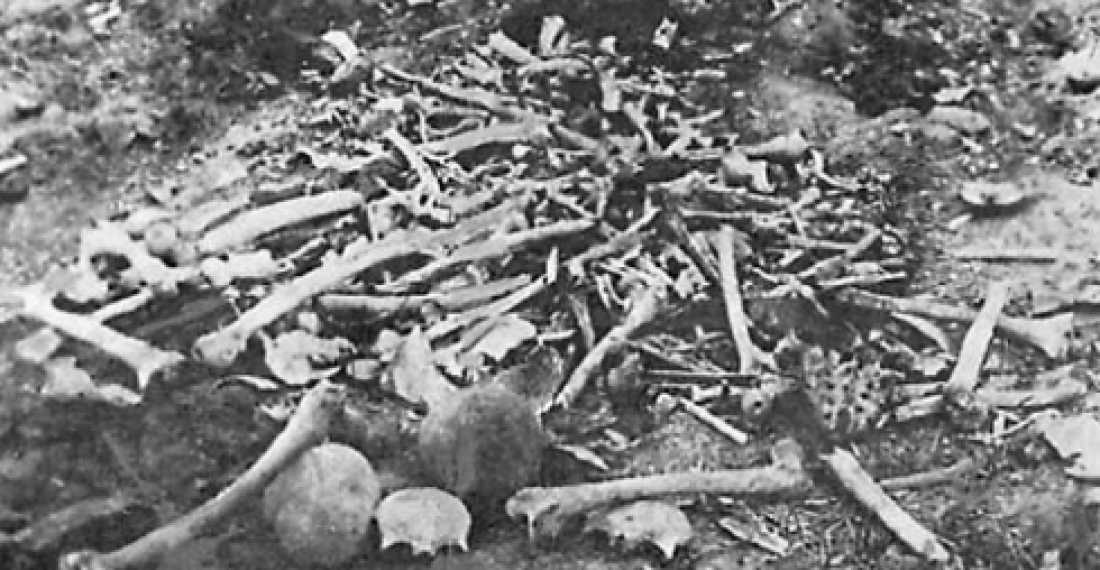The events in Eastern Anatolia in 1915 are a blot on 20th century world history. The massacre of hundreds of thousands of civilians, most of them Armenians, in the dying days of the Ottoman Empire, has left a huge scar that has never been healed.
As the world marks the 99th anniversary of these events, it seeks answers to why and how it happened, and a way forward that may enable the region to put the past behind it and live together in peace. Two modern states that did not exist in 1915 - The Republic of Armenia and The republic of Turkey - now struggle to deal with this baggage of history and to place these historical events in their proper context in present day reality. The rest of the world needs also to contribute to this process, for the sake of those who died in 1915, for their descendants, and more importantly for future generations.
In a speech marking Armenian Genocide Day, President Serzh Sargsyan of Armenia looked back at the past, but also sought to define the future. Looking at the past he said,
"Today we bow to the memory of the innocent victims of the Armenian Genocide. One and a half million Armenians fell prey to such a crime which did not have a name at that time. Nor had a human language coined such an expression or a term yet. They were killed simply because they were Armenians. The crime designed minutely and in advance pursued a clear goal: to take possession of the home country, the property and the millennium-old heritage by exterminating the native people living there. By this they committed a monstrous crime seeking to once and forever annihilate Armenians as a political factor."
However the Armenian leader also looked at the future:
"Today, we stand on the threshold of the 100th anniversary of the Armenian Genocide. This can afford Turkey a good chance to repent and to set aside the historical stigma in case if they make efforts to set free their state's future from this heavy burden.
At the same time, I publicly reaffirm: we do not consider the Turkish society as our enemy. Bowing to the memory of the innocent victims we remember all those Turks, Turkish families who lent a helping hand to their Armenian neighbors, friends being annihilated by the barbarians and helped numerous Armenian children escape from the clutches of the mob. God bless the memories of those who gave plenty of our compatriots a helping hand by risking even their and their families' lives. Every society including Turks should be proud of their ancestors who rescued lives and threw down the gauntlet to the Genocide. We remember this."
This year's anniversary is however different from the rest. For the first time the political leadership of the Turkish Republic has taken a sensible step forward on this issue by issuing a statement that whilst it may not satisfy Armenian demands, is a hugely important step, and needs to be recognised as such. Turkish Prime Minister Erdogan in his statement said,
"It is our hope and belief that the peoples of an ancient and unique geography, who share similar customs and manners will be able to talk to each other about the past with maturity and to remember together their losses in a decent manner. And it is with this hope and belief that we wish that the Armenians who lost their lives in the context of the early twentieth century rest in peace, and we convey our condolences to their grandchildren," said the statement.
"Regardless of their ethnic or religious origins, we pay tribute, with compassion and respect, to all Ottoman citizens who lost their lives in the same period and under similar conditions."
Erdogan added,
"The 24th of April carries a particular significance for our Armenian citizens and for all Armenians around the world, and provides a valuable opportunity to share opinions freely on a historical matter," the statement said.
"It is indisputable that the last years of the Ottoman Empire were a difficult period, full of suffering for Turkish, Kurdish, Arab, Armenian and millions of other Ottoman citizens, regardless of their religion or ethnic origin."
Looking forward, the Turkish Prime Minister said,
"The spirit of the age necessitates dialogue despite differences, understanding by heeding others, evaluating means for compromise, denouncing hatred, and praising respect and tolerance," he said. Turkey, he continued, has "called for the establishment of a joint historical commission in order to study the events of 1915 in a scholarly manner."
"Scholarly research to be carried out by Turkish, Armenian and international historians would play a significant role in shedding light on the events of 1915 and an accurate understanding of history," Erdoğan said, adding that Turkey has opened its archives to all researchers.
"The people of Anatolia, who lived together for centuries regardless of their different ethnic and religious origins, have established common values in every field from art to diplomacy, from state administration to commerce. Today they continue to have the same ability to create a new future."
The world community, governments, as much as civil society now needs to come together to help the modern states of Turkey and Armenia, and all Turks and Armenians all over the world, to use the next year in order that a better future can be constructed, for lessons from the past to be learnt, and to ensure that future generations are better informed of the past in order that such black pages in the history of humanity will never happen again, in Anatolia or elsewhere.
This commentary was first posted on www.links-dar.org
Photo: The remains of Armenians massacred at Erzenian. The US Ambassador at the time wrote, "Scenes like this were common all over the Armenian provinces, in the spring and summer months of 1915. Death in its several forms-massacre, starvation, exhaustion-destroyed the larger part of the refugees"







